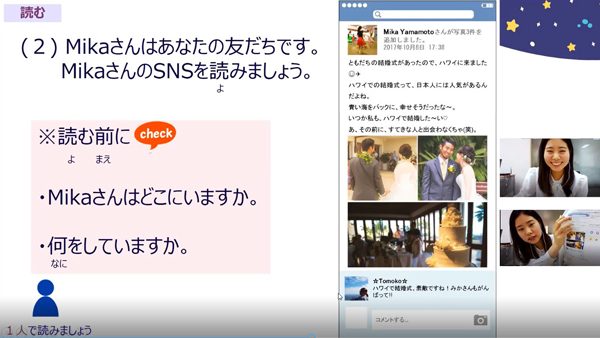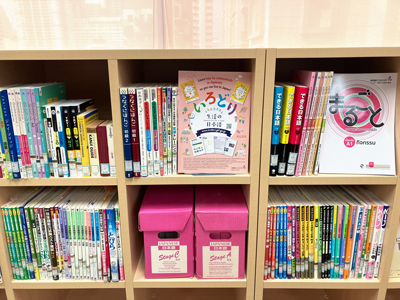2021 Japanese-Language Assistants’ Report: Every day is a Learning Experience
The Japan Foundation, Bangkok
OKUNO Sae
It is about eight months since I was posted to the Japan Foundation, Bangkok (JFBKK). From the beginning of my posting, a number of projects were postponed or cancelled due to the effects of COVID-19. However, we are responding flexibly by offering online classes instead. It is a pity that so much of my work is now online, and I have few opportunities to meet directly with Japanese language learners and teachers in Thailand. Nevertheless, I am able to perform various tasks as a Japanese-Language Assistant (hereafter referred to as "Assistant") at JFBKK. In this report, I would like to talk about the situation of Japanese language education in Thailand and tell you what kind of work I am doing.
Secondary school teachers in Thailand are very dedicated and student-oriented!
The work of a teaching assistant at JFBKK can be divided into two main categories. The first is to provide support for secondary schools. Of the 184,962 Japanese language learners in Thailand, 143,872 are secondary school (Japanese junior high and high school) students. They account for 77.8% of all Japanese language learners in Thailand (The Japan Foundation Survey Report on Japanese-Language Education Abroad 2018). Students at upper secondary schools (Mattayam 1-3) (high schools) study Japanese in the following three forms. (1) Major courses with 5-7 lessons per week, (2) elective courses with 1-2 lessons per week, and (3) Japanese language clubs with one lesson per week. Most of the students in the lower secondary schools (Mattayam 4-6) (junior high school) study Japanese in Japanese language clubs.
The "Japanese Brush-up Online Training" was held in November 2020 for teachers teaching Japanese at such secondary schools. This was done online in order to improve the Japanese language skills of Thai Japanese teachers. Originally, it was called the "Intensive Japanese Brush-up Training," an intensive training program where about 20 teachers from all over Thailand gather for about 30 days. Because it was done online, 34 teachers participated in the reading comprehension class over a period of two weeks. I was in charge of one of the classes offered at the training.

Japanese language brush-up training (The training was conducted using the JFS reading activities on “Minna no Kyozai” website.)
This link redirects to an external site, "Minna no Kyozai."
This was the first time for me to meet a Japanese language teacher from a secondary school. I was half-excited and half-anxious about what kind of teachers would be there, but they were very positive about participating in the training. They worked diligently in class and on homework assignments, as well as sharing what they had read during self-study time with the other participating teachers, using online tools. The reading comprehension class we had during this training was a little different from a normal class in some ways. And that was that, during the lesson, we focused on how to read skillfully. In reading comprehension, it is important to not just read, but to read with the purpose of finding the necessary information. Some of the teachers who participated in this training may be able to do this naturally, while others may not. I felt that, by making the participants more aware of "reading with purpose", they were able to understand the idea of "reading more efficiently and correctly".
From the results of the training questionnaire, we had comments such as "I will share what I learned in the training with my colleagues", and "I want to incorporate these lessons into my own classes." It was clear that the participating teachers undertook the training not only from the perspective of learners, but also from the perspective of teachers. I was strongly impressed by this attitude and was very happy to see that the teachers were willing to put into practice what they learned in this training at their own schools. At the same time, I realized that the work we do at JFBKK has an impact on Japanese language education at secondary schools in Thailand. There are times when I feel pressure, but I think the work is worthwhile and gives me a sense of accomplishment.
The work is not only "teaching Japanese"!
The second major task of the teaching assistants at JFBKK is to support Japanese language education for general learners. We also offer Japanese-language courses using "Marugoto: Japanese Language and Culture"("Marugoto") for the general public. I think "Marugoto" is a textbook that enables you to talk about yourself using Japanese. The students talk about their surroundings and interests in a lively manner, which makes the class very enjoyable.

Educational materials such as "Marugoto".
At the same time, we made a publicity video for "JF Japanese e-Learning Minato," a Japanese language learning platform created by the Japan Foundation Japanese-Language Institute, Kansai. JFBKK has three original courses offered at overseas branches. However, in reality, they are not very well known. With the help of influencers in Thailand who communicate about Japanese language and culture, we created a video JF Japanse e-Learning that conveys the appeal of Minato and the original course. In addition, we held an online workshop, organized mainly by local teachers, to introduce the e-learning materials for learning Japanese created by the Japan Foundation for beginners of the language. You can see the materials on the official YouTube channel of JFBKK. In addition to teaching Japanese, I think it is very important for me to play a role as Assistant of JFBKK, as a Japanese language teacher, and to promote Japanese language learning e-learning and other programs.
Moving forward...
Although it has not been a year since I was posted, with the help of Japanese-Language Senior Specialists, Japanese-Language Specialists, and local teachers, I am involved in various tasks other than those mentioned above. As I am inexperienced, every day's work is a learning experience for me. I hope that COVID-19 will end soon, and I will do my best in my remaining term to contribute to the development of Japanese language education in Thailand.
- What We Do Top
- Arts and Cultural Exchange [Culture]
- Japanese-Language Education Overseas [Language]
- Japanese-Language Education Overseas [Language] Top
- Learn Japanese-language
- Teach Japanese-language
- Take Japanese-Language Test
- Know about Japanese-language education abroad
- The Japanese-Language Institute, Urawa
- The Japanese-Language Institute, Kansai
- Japanese-Language Programs for Foreign Specified Skilled Worker Candidates
- Japanese Language Education for Japanese Children Resident Overseas and for the Descendants of Migrants
- Archives
- Japanese Studies and Global Partnerships [Dialogue]
- JF digital collection
- Other Programs / Programs to Commemorate Exchange Year
- Awards and Prizes
- Publications
